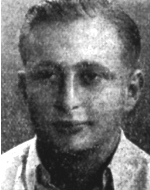Son of-Hanna (Zina), daughter of Shlomo Kabash, writer and Dr. Avraham Winshel (lawyer), was born on 19.10.1927 in Haifa, studied at the Reali School and was interested in sports (soccer, swimming) After completing six classes at the Reali School, he went to Beirut (Lebanon) and completed the International College of the American University, returning to Israel and passing the University’s London University Examinations, and visiting Law School Mr. Duchan, one of the school’s lecturers, wrote: “I have often enjoyed hearing his full answers, content and legal understanding at the Seminar for Law “He was a lawyer in Jerusalem and wrote about him:” In his head everything was all-knowing, all the time he was in the courtroom, It is clear that sometimes it was impossible to believe that these complex and sophisticated arguments were uttered by a young child who had not yet completed his law school. Not only did he understand the law, but he also loved it and was interested in it. “In September 1947, he traveled to London and began attending the famous school He studied the questions of public law, sociology, and economics, and worked on preparing plans for the building of the country, and when the War of Independence broke out, he decided to return to Israel and fulfill his duty without waiting for an order. In his letter to his parents of February 16, 1948, he wrote: “It is not pleasant to leave school now, but it is still less pleasant to know that my friends are ill I know that the things for which I was brought up are destroyed or may be destroyed without a finger being raised … It may be worthless to be a soldier, but in spite of everything, if everyone thinks so, imagine what a sad situation there is ” In mid-May 1948, he returned to Israel and joined the Artillery Corps as a radio operator, and told his friends: “I did not come to look for a job but to fight.” He was always in the front battle positions, and three weeks after his enlistment he took part in operations near Latrun. Participated in the conquests in the Upper Galilee and the Western Galilee. In the middle of December 1948 he was transferred to an anti-tank company that participated in the last battles in the Negev because he demanded that they take him to a combat operation, Shaul fell in Operation Horev to expel the Egyptian army from Israel, On December 21, 1948, in his last letter, he wrote to his friend: “My dear, you will surely be surprised at the urgency of my letter, but before one goes to the unknown “The letter stopped in the middle and his life ended in the middle, and the commander of his unit wrote:” After his death, the following passage is found in his papers, In Rio the soldiers and the public in general: “When a person sacrifices his private happiness for society, endangering his skin and pouring his sweat and blood on the altar of the homeland, he has one sacred right – the right to a clear conscience. The person who fights for the society and serves it not to receive an award is entitled to know what he is fighting for, and if the goals for which he is fighting justify his sacrifice, he is entitled to be convinced that the war is being conducted in a manner that is acceptable and likely to bring it to an end. Finally, he is entitled, at the end of the war, to the realization of his immediate goals, his elementary securitySociety against fear and deprivation. These demands are logical and although they seem to be achievable, it is unfortunate that because of their non-existence to date, there has been a lot of bitterness in the Lev of the soldier. ‘”
